The climate crisis is complicated and interconnected. Art about it should be, too
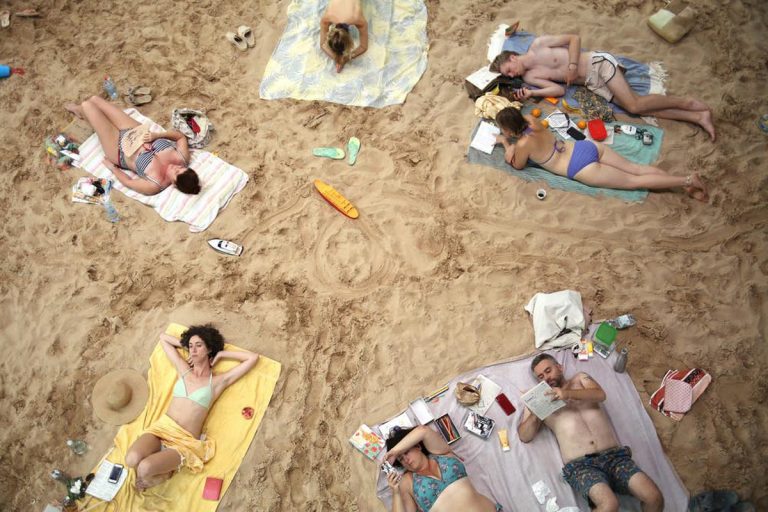
Lucia Pietroiusti and Helen Turner met the way many friends do: someone was looking for a pool. But Pietroiusti had a much less typical use in mind. As the founding curator of Serpentine Galleries’ General Ecology project, she was scouting new locations for the Golden Lion-winning Sun & Sea (Marina) that had wowed crowds at the last Venice Biennale.
“When we were thinking about the piece for Venice, we looked for a while for an empty swimming pool,” Pietroiusti says, “partly out of conversations with the artists about suitable spaces and partly because of how apocalyptic the feeling of doing this piece inside an empty swimming pool would have been.”
Though the pool idea didn’t work for Venice, the piece will soon appear this way at E-WERK Luckenwalde, a former East German coal plant converted into a renewable energy plant, where Turner lives and programmes art installations and performances. The pool next door was built to make use of the excess heat energy from burning coal; in May, with help from a live Kickstarter campaign, it will host an internationally acclaimed opera about the climate crisis.
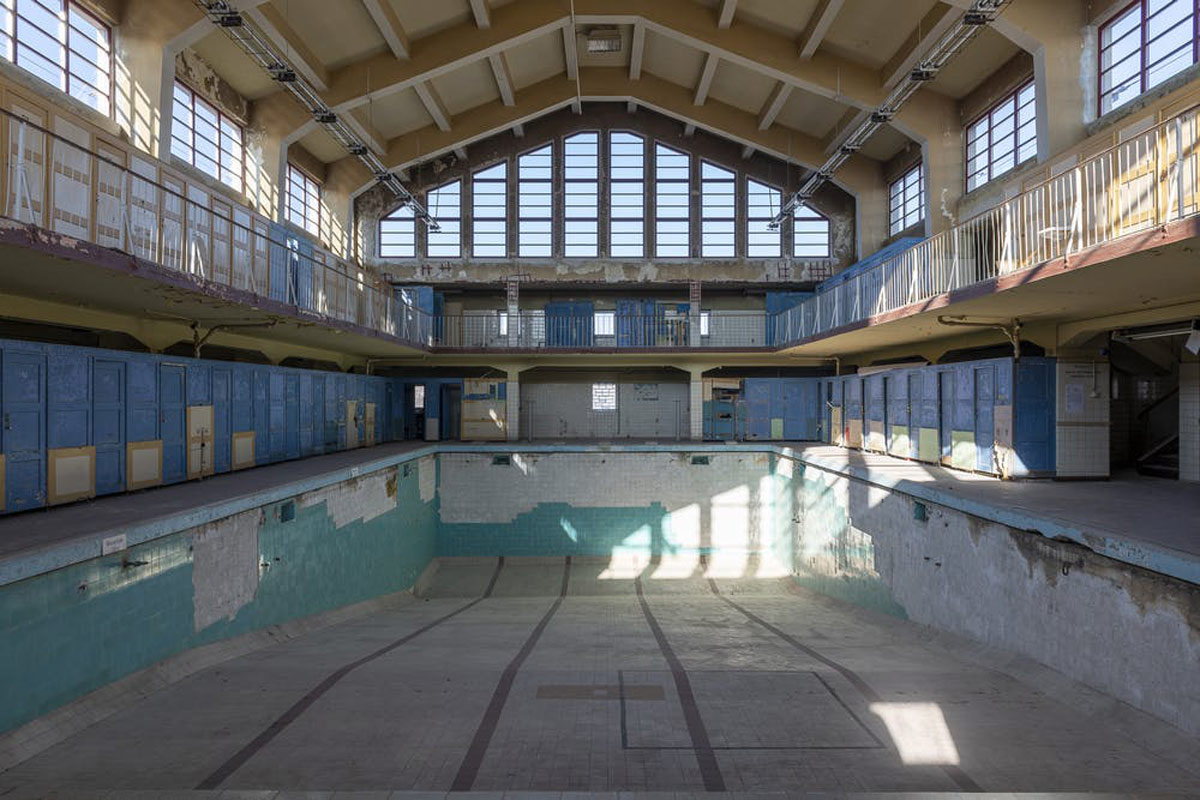
The origins of E-WERK
Turner’s partner, artist Pablo Wendel, started creating his own electricity for artworks after struggling to pay his utility bills, Turner says, “and then it kind of snowballed.”
He started experimenting with electricity-generating art, established Performance Electrics gGmbH as a not-for-profit energy provider, converted an abandoned coal plant to renewable energy, and started selling his unconventional electricity into the national grid, funding art residencies and exhibitions with the proceeds of neighbours’ utility bills.
At the time, Turner was a curator based in London. “Pablo said, ‘Just come and have a look at this building and this project.’” A few months later, she was living there, with a new dog, a baby on the way, and an international, ambitious contemporary art programme.
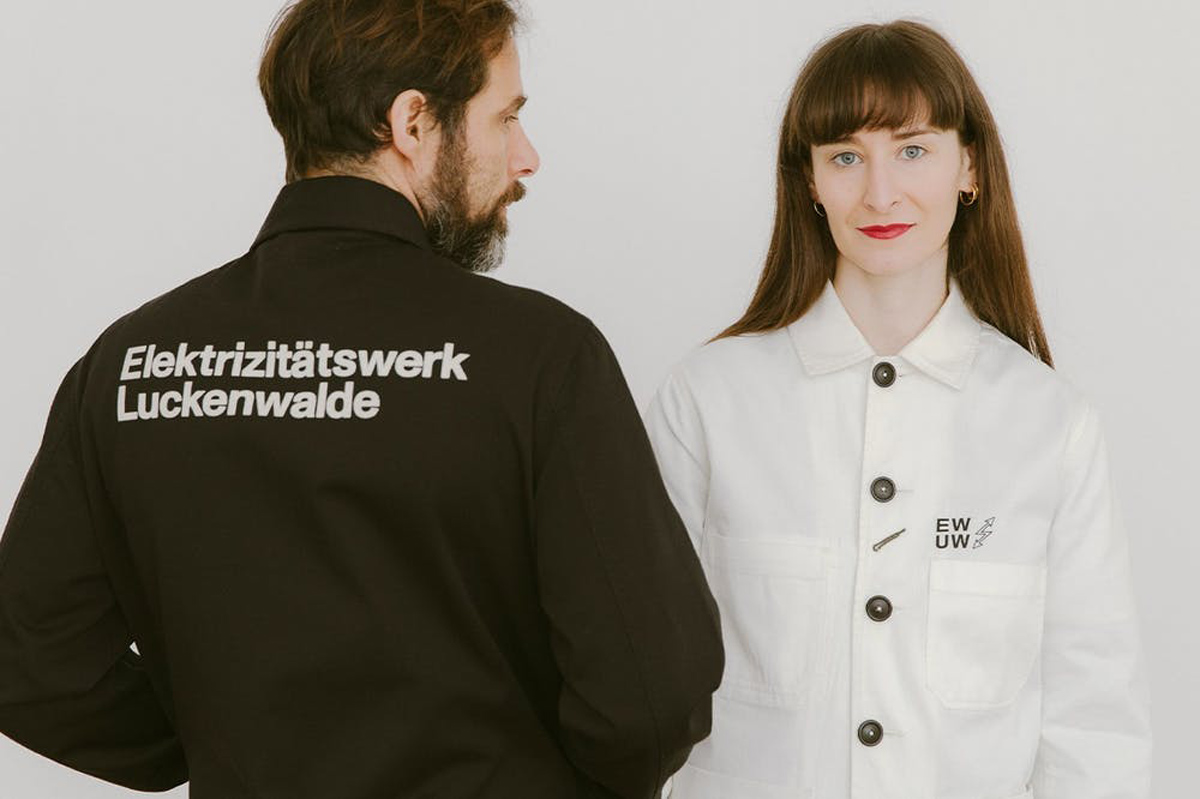
Mothers are a necessity of environmentalism
Turner is the kind of person who has a tendency to dive in with both feet. “I’m a really big believer in subversion from within, to actually insert yourself within these systems that you’re critical of,” she says. “Pablo and I had always been quietly frustrated by the art world chatting the chat and talking about climate change and ecological justice but never actually taking any direct action. And I think that’s what we were so determined to do with E-WERK, was just to do something, even if it would fail, even if it was this huge-scale experiment that wasn’t 100 per cent green or 100 per cent foolproof.”
Being a mother, she says, has been part of that. “They’re such amazing teachers, children. Having children opens up so many more doors than it closes, in terms of thinking about the future. And the feeling of wanting to do something that’s bigger than yourself, I think is just so important.”
Motherhood also brought Pietroiusti into her environmental work. Before leaving for maternity leave in 2017, she was Serpentine’s curator of public programmes; upon her return, she proposed General Ecology, a project dedicating the London gallery to environmentalist curation as well as change from within. “It happens to a lot of people,” she says, “when they have children, they start to feel accountable for time in the future beyond their own life. And even just that tiny change in perspective allows you to find accountability or responsibility over even longer periods of time.”
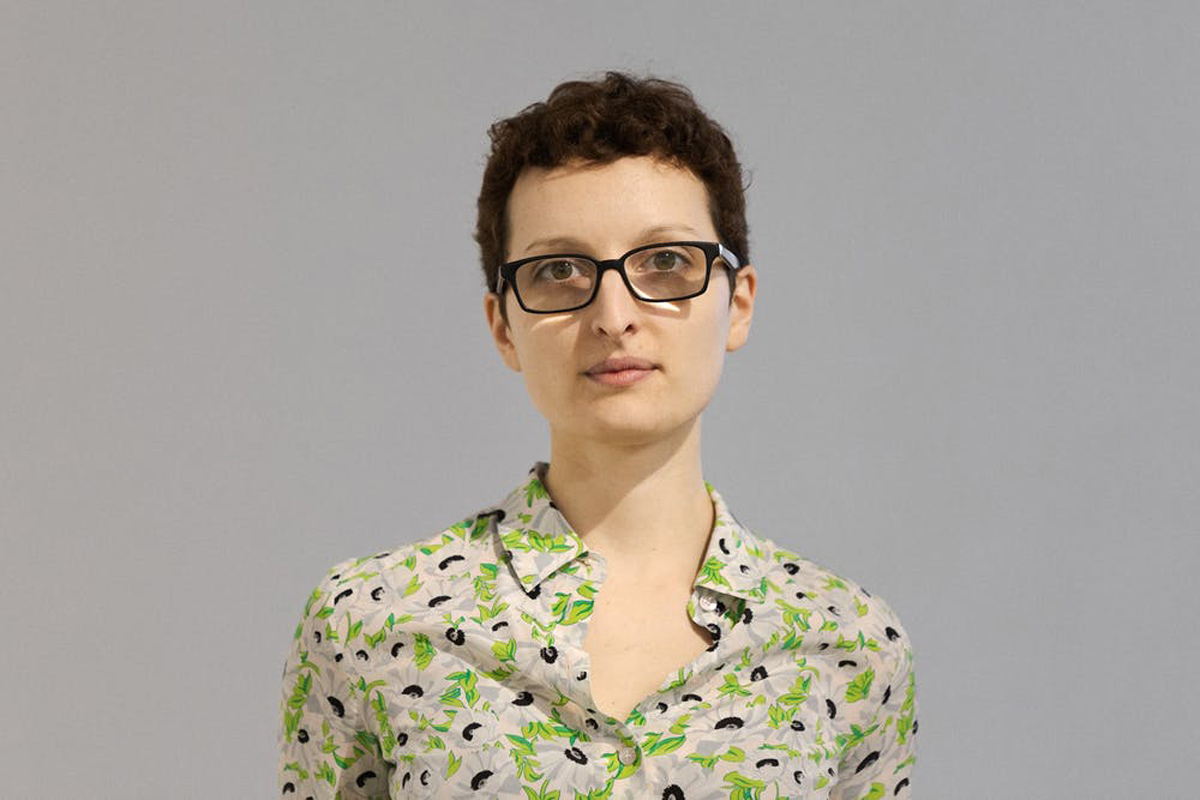
Why ecology needs art
Art ties naturally into this longer time horizon that Turner and Pietroiusti are both attracted to. Symbols and artifacts speak fluently across generations and civilisations.
“Once you start to dig into the endurance of art through deep time and across all cultures,” Pietroiusti says, “once you start to look at what those forms, whether it’s art proper, or ritual, or forms of myth, or poetry, you actually find that there wasn’t that big a gap between art and planetary knowledge—what we now refer to through the prism of science. Knowledge about agriculture, about the environment, about the weather, these forms encoded knowledge about how to live on the planet and how to live in a mutually supportive and regenerative way. And so art may be one of the very rare and enduring forms of that kind of deep time memory that is left in this present time, which is otherwise so much a product of enlightenment and its ‘understory,’ that is, colonial expansion and violence, extraction, and land dispossession.”
This is part of what drives her interest in ecology not just as subject matter, but as a way of working. “I often describe it as a tree in a forest network,” she says, “growing outwards with the presentation of programmes that are consistently and obsessively about ecology in the widest possible sense.” Under the surface are the roots of mission statements, ways of working, and institutional commitments, and all around and sideways are the mycelium networks of cross-disciplinary and cross-organisational collaborations.
The primacy of interconnected collaborations in this model is important because it positions the environmental crisis as a complex one that requires us all to come together with equally complex responses, Pietroiusti says. And it might explain why the Sun & Sea (Marina) opera is so powerful.
An environmental turning point at the Venice Biennale
When Pietroiusti brought Sun & Sea (Marina) to the 2019 Venice Biennale, the team was very intentional about ecology as a method. They translated it to English and readapted it as a continuous loop so more viewers could interact with it. They considered the future life of all the sand they carted in, ultimately converting it to play areas for children in an otherwise pretty kid-unfriendly city.
The warm reception of the piece didn’t happen all at once. For the first several days, just a trickle of visitors came in—and then suddenly a flood. Queues of visitors snaked through the neighbourhood to see it, and emerged visibly distraught. “I mean weeping,” Pietroiusti says. “I remember half-jokingly saying the art world might be having a nervous breakdown. Because I couldn’t quite get my head around what it was. I mean I did feel that it was a masterpiece. But all of a sudden the art world was ready to talk about the climate emergency, and did, so the piece must have struck a chord.”
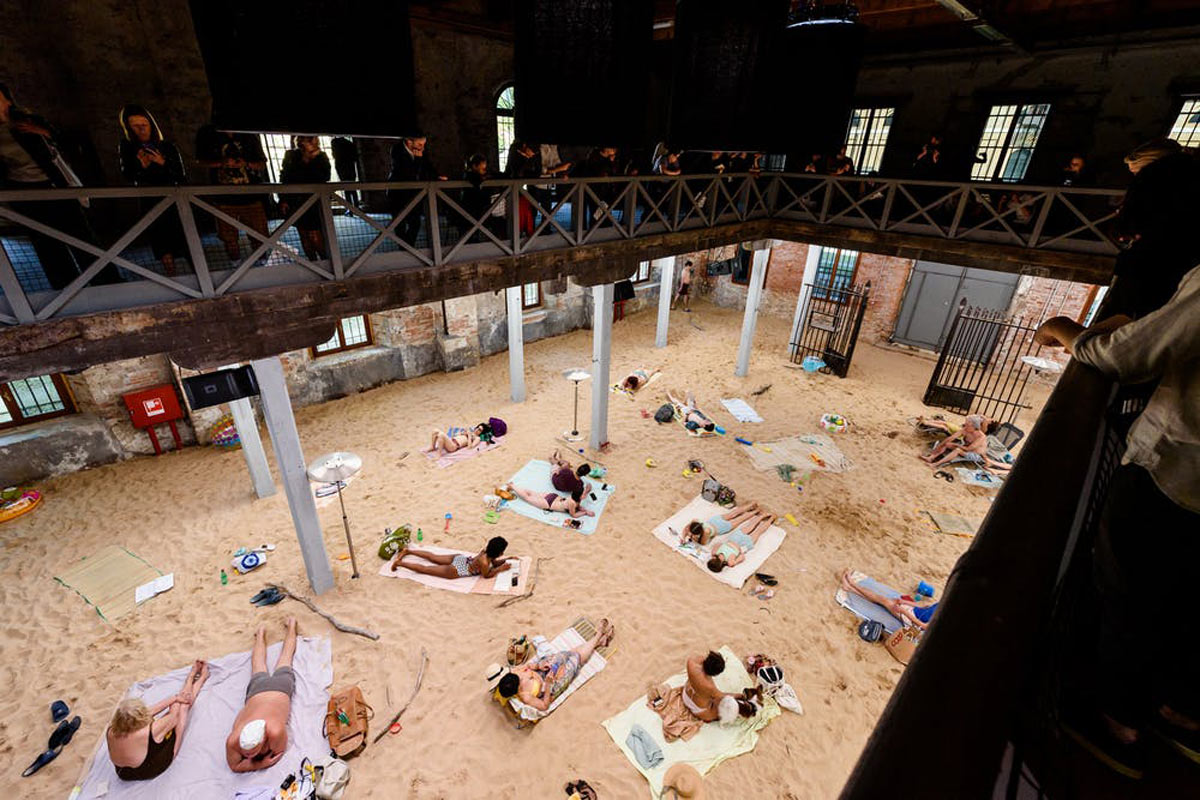
In a certain sense, Pietroiusti knows it was the wider cultural moment—Donald Trump had removed America from the Paris Climate Agreement, Bolsonaro was destroying the Amazon rainforest. “All of those things had grown a sense of dread,” Pietroiusti says, “of course, a part of the world felt dread at a distance while another part was right in front of emergency. The environmental emergency is unequally distributed.”
And maybe that is the true power of the piece. By being so expansive and inclusive but also in some ways banal—it’s the musical musings of mostly spoiled people at a beach—it puts the art world’s mostly non-confrontational relationship with the climate crisis in sharp relief. “The piece reflected back to the audience certainly the sense of being both right in front of a disaster and incredibly far away from it at the same time,” she says, “and brought with it what I interpreted as being some kind of ‘oceanic feeling’ of a very complex, very big, and momentous object that was right there the whole time, and we just weren’t looking at it.”
Bringing it all to E-WERK
Turner remembers being delighted by the wave of environmental interest and accountability following Sun & Sea (Marina)’s splashy international debut. “It was so refreshing for the art world, which can be this very stiff and arrogant landscape to say, ‘Yeah, okay, we don’t know how to do it. So, let’s try and do it collectively.’ And there was this motion of working more collectively,” she says.
Her original plan for curation at E-WERK was to bring all kinds of art programming into the sustainable space, but the dynamic dialogue unfolding around sustainability in the past few years has proved irresistible. “I can’t help it,” she says, “I keep falling back into it, because it’s just such a rich, interesting terrain.”
As she’s done that, she’s been extremely mindful of inviting the local community into these sustainability conversations. The local football club, for instance, hosts their annual after-party there.
Her wider community is already excited about Sun & Sea in particular: local press is streaming in; neighbours ask if they can bring their dog to “the beach” (in the decrepit industrial swimming pool). “I think that’s because of, like Lucia is saying, its interdisciplinary nature,” Turner says. “It’s opera, it’s the beach, it’s art, and also the energy here. I think all this smashing together of diverse disciplines just creates so many more open doors.”
It’s also part of why they’re bringing the piece to Kickstarter. “The crowdfunding campaign is kind of in keeping with these ideas of autonomy that we’re trying to establish with E-WERK,” she says. “The reason we feed electricity into the national grid is so that we’re not completely reliant on state funding, or patrons, or philanthropy, or corporate sponsorships. It was this real endeavour to be independent and programme without artistic compromise. I think the crowdfunding campaign is part of that.”
BRING THE SUN TO LUCKENWALDE is live on Kickstarter through 5 April, 2021.




